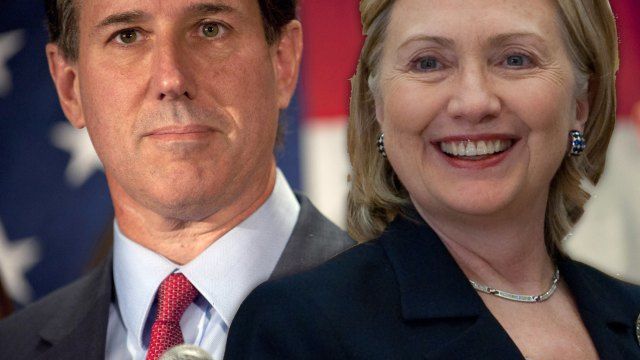
While the media has been focusing on the newer blood in the 2016 presidential election, some of the old timers who’ve been through this process before aren’t getting the sound bites they’re used to. Hillary Clinton has been getting her share of the coverage, but Rick Santorum and Mike Huckabee were pretty much collateral damage.
For many White House hopefuls, Iowa is the promised land. As the site of the first caucuses on the presidential primary calendar, a strong finish in Iowa can provide a shot of energy to lesser-known candidates, giving them more media attention and momentum as the race continues to other early-voting states.
Since the 2016 contest doesn’t involve an incumbent president, both Democrats and Republicans are hashing out who will be each party’s nominee. While that means a lot of new faces have been brought to the national political stage, there are three candidates this year who have gone through this before such as former Arkansas Gov. Mike Huckabee, former Pennsylvania Sen. Rick Santorum and former Secretary of State Hillary Clinton have all run for president in the last eight years. Our friends at Inside Gov examined how each of their previous campaigns compares to their current showings.
Mike Huckabee
In 2008, Huckabee won Iowa with support from 34 percent of the state’s caucus-goers. An ordained Southern Baptist minister, the Republican former governor leaned heavily on Iowa’s base of evangelical voters to secure his win. Indeed, when his polling numbers started to pick up steam in the run-up to the caucuses, Huckabee attributed the boost to divine intervention. “There’s only one explanation for it, and it’s not a human one,” Huckabee told a crowd at Liberty University in December 2007. “It’s the same power that helped a little boy with two fish and five loaves feed a crowd of 5,000 people.”
But 2016 was a different story for Huckabee, who hosted a Fox News talk show and wrote a handful of books in the eight years between his presidential runs. On Feb. 1, Huckabee got 1.8 percent of support in Iowa, putting him in ninth place among his fellow Republicans. He dropped out the same night.
Rick Santorum
After almost two decades on Capitol Hill representing Pennsylvania in Congress, Santorum’s name was first floated as a potential presidential candidate in 2008. The Republican took the plunge in 2012, and hung his aspirations on his social conservativism. Shortly before he officially announced his candidacy, Santorum addressed the Faith and Freedom Coalition, saying that unlike other politicians “who come and make the pledge, vow to social conservatives that they’ll check the boxes” he doesn’t “just take the pledge, I take the bullets.”
Like Huckabee in the previous cycle, Santorum found favor among Iowa’s Christian conservative caucus-goers in 2012. Although Mitt Romney initially was declared the winner of the state’s caucuses, once the Iowa GOP certified all of the results, Santorum edged him out by 34 votes. The strong showing in Iowa provided a shot of energy to Santorum’s campaign, which fundraised more than $1 million in the 24 hours after the Iowa caucuses.
Four years later, the reports from Iowa aren’t as rosy. Santorum received 1 percent of support, which put him in 11th place within the Republican field. He failed to make the main debate stage at any of the seven Republican debates, and hovered around 1 percent in Iowa polls, according to averages from RealClearPolitics. According to Republican sources, Santorum is planning to end his presidential campaign on Feb. 3 and endorse one of the remaining GOP candidates.
Hillary Clinton
After years of speculation about her White House aspirations, Clinton mounted her first presidential bid in 2007. She held a significant lead in the polls in the run-up to Iowa, but then-Sen. Barack Obama nabbed a surprise win — 37.6 percent to Clinton’s third-place finish at 29.5 percent — in the caucuses after a still-standing record turnout. Clinton entered the 2008 race as the all-but-inevitable nominee, but she couldn’t fend off the populist-tinged message and anti-Iraq War sentiments that made Obama resonate with voters.
Sound familiar? Clinton announced her 2016 run to much of the same talk of inevitability, with most politicos assuming she would skate to the nomination. But Vermont Sen. Bernie Sanders, who launched his campaign in April 2015, has tapped into the same anti-establishment frustration that has upended the Republican Party. His poll numbers climbed steadily, and his laser-focused message on income inequality and campaign finance reform continue to earn him huge crowds at campaign events.
Clinton and Sanders were neck-and-neck in Iowa polls leading up to the caucuses on Monday, and the race was too close to call until Tuesday afternoon. Clinton ended up with 49.8 percent to Sanders’ 49.6 percent. The former Secretary of State eked out the win this year, but the close race proves there’s nothing inevitable about her candidacy.

